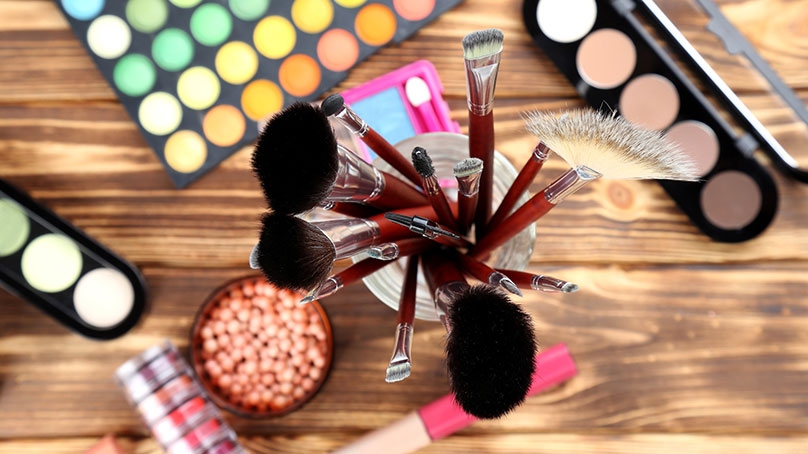Don't Put That On Your Face! It's Time To Clean Out Your Makeup Bag
August 02, 2017 | Food Lion


Cosmetics and makeup brushes are not meant to be kept forever. If you're still using the same mascara and foundation you were using two years ago, it's time to purge. Beauty experts chime in on what to ditch and when.
You use makeup to enhance your natural features, to put your best face forward. But if you're not diligent, the very cosmetics that are intended to improve your appearance can have the opposite effect.
"Once opened, most cosmetic products like lipstick, eye shadow, and foundation can be safely used for roughly one to two years," says Karol Young Moses of ICArtistry.com, a makeup artist and beauty expert from Southern California. How long you should hang on to any one product, however, depends on the form (is it liquid or solid?), where it's used on your face, and how long it might have been sitting on a shelf before you opened it.
Mascara, Eye Shadow, and Eyeliner
"Most people think you can use mascara until it runs out, but you should replace it every three months," says celebrity makeup artist LaToya Perry. "As soon as you pull the wand out of the tube, you let oxygen in and create a breeding environment for bacteria."
Freelance makeup expert and beauty blogger Hillary Kline is "adamant" about replacing her mascara every three months. "Expired makeup can contain a ton of germs," she warns. "You run the risk of getting an infection — such as pinkeye — when you use expired mascara or eyeliner. I don't want to have bacteria build up that might cause eye irritation or infection."
Moses agrees and says, "The life span of a mascara is anywhere from one to three months, depending on the brand — bargain items tend to dry out in weeks, while prestige products usually apply smoothly through the third month."
Dermatologist Alan J. Parks, founder of Eastside Dermatology & Skin Care Center and DermWarehouse, also supports the three-month rule. "The eye area is more prone to infection," he cautions.
Beyond the potential health risk is the fact that mascaras, eyeliners, and eye shadows simply become less effective. "The application becomes more difficult because the consistency changes over time," says Kline. “Examine the product before putting it on your eyes."
Foundation (and Lipstick, Too)
The options you have for evening out your complexion are staggering. Foundation comes in liquids, creams, powders and more. But, whatever your product of choice, it's not something you should hang on to forever because old makeup can harbor bacteria which can cause skin irritation and acne-like bumps.
"I would first check the container for an expiration date," says Dr. Parks. “Liquids have about a two-year shelf life. Powders are closer to six months to a year."
Moses suggests keeping an eye (and nose!) out for changes. "If you discover an unusual odor or a change in texture in consistency, or if your foundation looks like it's separating or getting watery, toss it immediately," she advises.
Perry, who discards opened foundation after six months, uses the smell test, too. "If you open your foundation and it doesn't smell right, get rid of it! " she says. "Better to lose a few dollars than to walk around with a nasty skin rash."
As for those fabulous lipsticks, lip liners, and glosses? Perry and Kline replace theirs every year.
Makeup Brushes
"You have to remember that, as you use the brushes, there is a transfer of dirt and oil from your face to the brush," says Perry. "Can you imagine the bacteria that builds up? Yuck!"
"I clean mine at least once a week," says Kline. "If you don't wash them, bacteria will build up and transfer over to your skin."
A good makeup brush can last 10 years or more. "You can keep using your brushes as long as they are cleaned regularly and do not have a significant number of bristles falling out," says Alyce Green, who publishes MakeupBonuses.com.
Green explains that the type of brush (natural hair versus synthetic) and how it's used (with creams, powders, gels, etc.) generally determine how often it should be cleaned. "Clean synthetic brushes every other day," she recommends. "These are often the brushes that are used for creams and liquid-based products, which can get contaminated quickly." Natural-bristle brushes should be cleaned weekly with water and a gentle soap or brush cleaner. "This type of brush is typically used for powders, which have a longer shelf life."
Speaking of Shelf Life...
How long can you keep makeup that has not yet been opened? "If you like to stock up on your beauty items, you can store them unopened for up to about two years," says Moses.
Sandy Taylor, makeup artist and editor at www.foundationfairy.com, explains that there are currently no laws in the U.S. that require cosmetics manufacturers to put expiration dates on the label. "But they are required to ensure that their products are safe," she says, so, generally, manufacturers will disclose a "use by" date for makeup that has a shelf life of 30 months or less.
Well-Kept Beauty is a new mobile app that helps track expiration dates on beauty products. Just scan and sync your products to receive alerts when the product is set to expire. The app then lets you shop for suggested replacements from the most-trusted brands, from Tom Ford and Marc Jacobs to your favorite drugstore staples.
Bottom line: Don't hang on to that favorite compact or mascara. Clean those cosmetic brushes and replace your makeup as needed. Your face will thank you for it!






Create Your Display Name